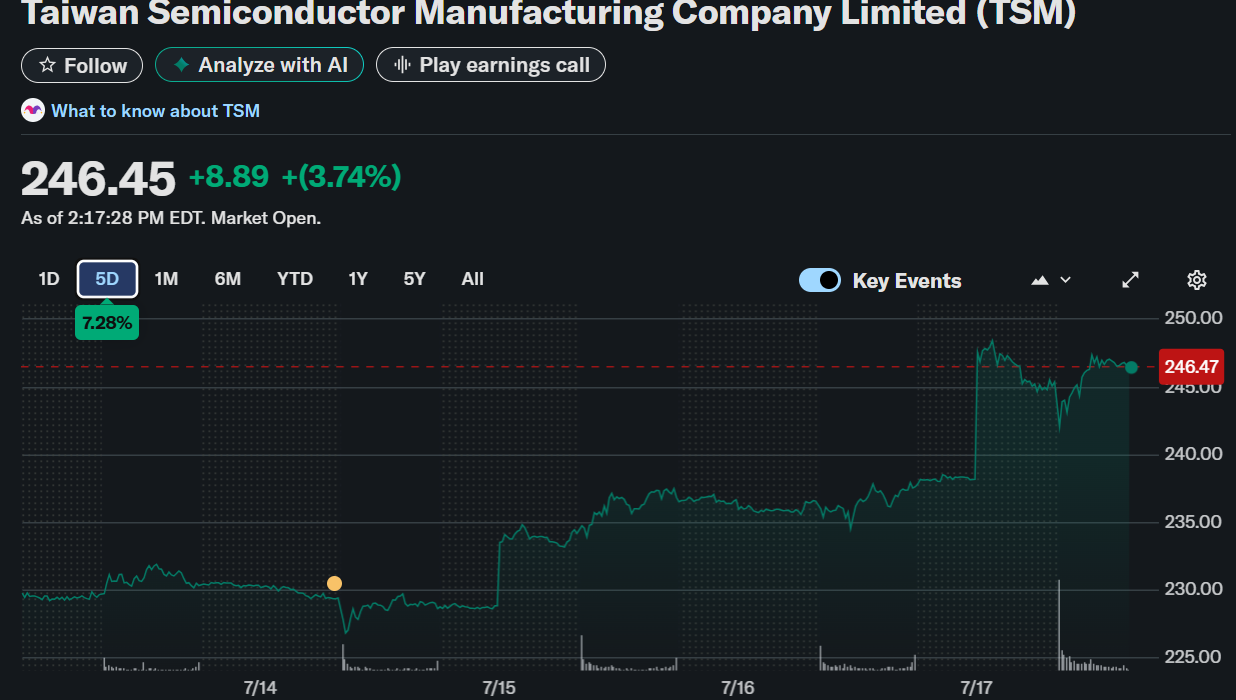TLDR
- Q2 net income surged 61% YoY to NT$398.27 billion, beating estimates
- Revenue jumped 38.6% to NT$933.79 billion on strong AI and HPC demand
- Stock rose 3.89% to $246.80 during Thursday’s session
- Advanced chips (≤7nm) made up 74% of wafer revenue
- TSMC forecasts Q3 revenue between $31.8B and $33.0B
Taiwan Semiconductor Manufacturing Company Ltd. (NYSE: TSM) traded at $246.80, up 3.89%, as of Thursday afternoon after posting a record second-quarter profit for fiscal 2025.

Taiwan Semiconductor Manufacturing Company Limited (TSM)
The company reported net income of NT$398.27 billion, a 61% increase from the prior year, and well above the NT$377.86 billion consensus. Earnings per share rose to NT$15.36, compared to NT$9.56 in Q2 2024. Revenue also surged 38.65% year-over-year to NT$933.80 billion, surpassing estimates of NT$931.24 billion.
The June quarter’s growth was primarily driven by continued strength in AI and high-performance computing (HPC) chip demand. TSMC manufactures cutting-edge processors for key clients such as Nvidia and Apple, and this has fueled its dominant position in the global semiconductor market.
AI and Advanced Technologies Lead the Charge
High-performance computing, including AI and 5G applications, accounted for 60% of total revenue in Q2 2025, up from 52% in the same period last year. TSMC said that chips made on process nodes 7nm or smaller represented 74% of wafer revenue, underscoring the growing market shift toward more advanced designs.
CEO C.C. Wei emphasized that the firm expects full-year revenue to grow 30% in USD terms. CFO Wendell Huang echoed this optimism, pointing to robust demand for leading-edge technologies to support third-quarter momentum.
Strong Q3 Outlook, Despite Macroeconomic Risks
For Q3 2025, TSMC guided for revenue between $31.8 billion and $33.0 billion, representing roughly 8% growth from the prior quarter at the midpoint and a 38% YoY rise. The firm expects operating margins between 45.5% and 47.5%.
Despite its strong positioning, TSMC acknowledged several macro risks, including potential U.S. tariffs under Donald Trump’s trade policy proposals. Taiwan faces a 32% tariff threat and ongoing negotiations with the U.S. could impact sentiment. The company is also watching for order reductions from smartphone and PC clients, Taiwan dollar appreciation, and U.S. export controls on China-bound chips.
Long-Term Performance Remains Robust
Despite geopolitical headwinds, TSMC’s long-term returns have been impressive. As of July 17, 2025, the stock delivered a year-to-date return of 23.64%, a 1-year return of 34.09%, and a staggering 5-year return of 302.99%, far outperforming the TSEC Capitalization Weighted Index.
The AI chip boom, especially at advanced process nodes, is expected to sustain TSMC’s leadership. Analysts like Brady Wang and Sravan Kundojjala highlight the sustainability of demand and potential in future quarters, even as policy uncertainty looms.








